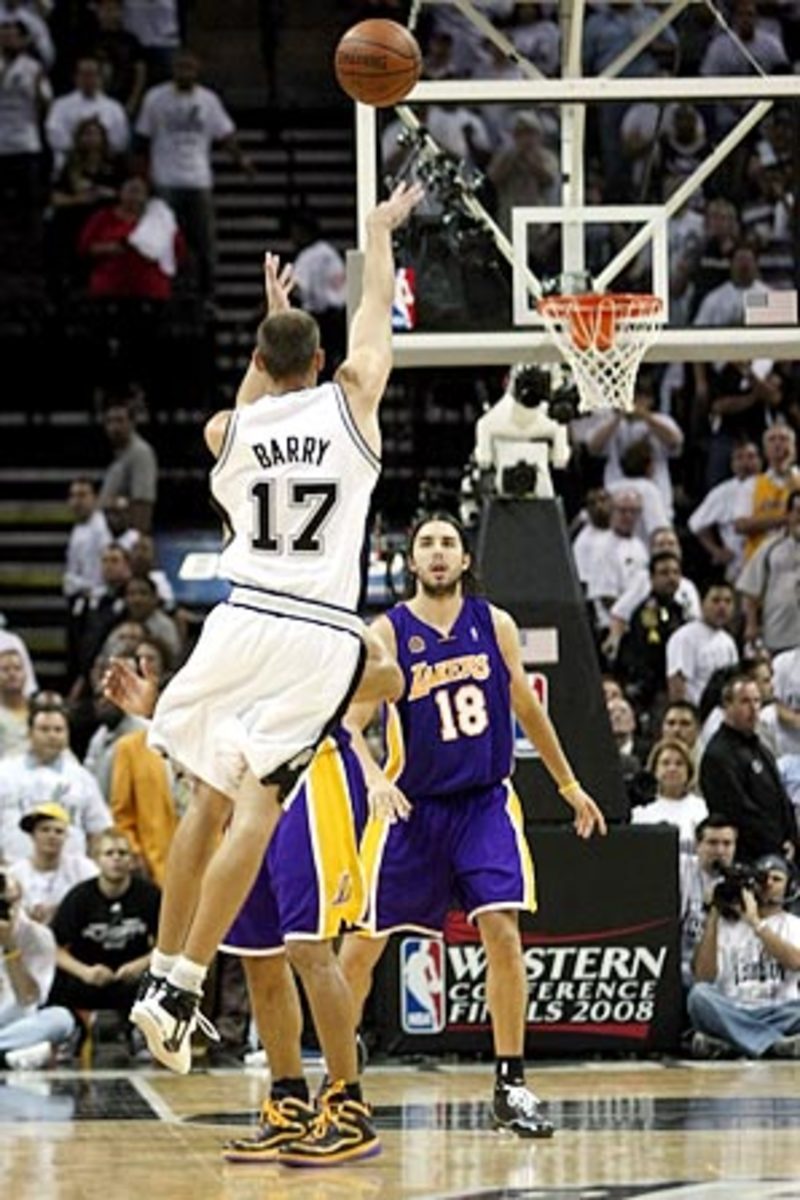Playoff musings: No-call was fitting conclusion to Spurs-Lakers game
The hot topic of playoff officiating has been put under even more scrutiny after what happened in the final seconds of the Lakers' 93-91 victory against the Spurs in Game 4 of the Western Conference finals Tuesday.
The thing you hear over and over from coaches and players is that all they really want from referees is consistency. And if there is one thing officials have demonstrated throughout the postseason, it is that they aren't going to make a last-possession call to decide the outcome of the game unless the violation or foul is so egregious that it can't be overlooked.
Spurs fans are livid over Tuesday's final possession (which can be seen here), when Derek Fisher was not called for a foul after he jumped into Brent Barry as the San Antonio guard maneuvered for a last-second shot.
Was Barry fouled? Absolutely.
Should it have been called? Absolutely not.
It's all about consistency.
From stars such as LeBron James to backups like Barry, players haven't gotten last-second, game-deciding calls during the playoffs, partly because officials want the players to determine the outcome just as much as the fans do.
The only problem with that logic is that by not making those calls, the officials are indeed helping decide the outcome. If it is a foul in the first quarter, why isn't it a foul in the final second? Because that just isn't the way the NBA plays, and as long as the players know it and the officials are consistent with it, there is no reason for anyone else to cry foul.
Not even Barry -- who had the playoff game of his life with 23 points in 27 minutes, making five of his team's six three-pointers -- believed a foul should have been called on Fisher.
"That's not going to get called in the Western Conference finals," Barry told reporters after the Spurs' loss, which left them trailing 3-1 in the series. "Maybe in the regular season. But that call shouldn't be called in the Western Conference finals."
Spurs coach Gregg Popovich agreed, saying, "If I was the official, I wouldn't have called that a foul." Tim Duncan, who has a reputation for questioning referees about non-calls, didn't dispute this one, either. "You're not going to get that call," he insisted. "They're not going to make that call."
• The Celtics' Kevin Garnett can do no right. His defense and leadership have gotten Boston within two wins of the championship round, with two of the last three games (if necessary) of the Eastern Conference finals at home, yet critics still attack him for not coming up big in crucial situations and for not taking over the game offensively.
How many times and how many ways can we say it -- that isn't Garnett's style. He isn't the last-second, go-to guy unless it is by default. He isn't a classic low-post player or great off the dribble, and he doesn't get to the free-throw line that much. But he still does all of the things that help put his team in position to win. Paul Pierce is the go-to guy for the Celtics. Period.
• The NBA, in trying to make its broadcasts as fan-friendly and as interesting to the television audience as it can, requires each coach to be interviewed by a sideline reporter at some point in the middle of every game. Much of the time, coaches do little more than state the obvious. A coach should never have to break his concentration or be forced away from his team during a timeout to talk to the media. Coaches deserve a little more respect than that.
• Sometimes games come down to basic fundamentals. Careless turnovers and the failure to come up with defensive rebounds have cost teams more games than any last-second shots. The Spurs, for instance, gave up 26 second-chance points -- and scored only four themselves -- in their Game 4 loss to the Lakers.
• As Manu Ginobili goes, so go the Spurs. He is averaging 23.1 points on 46.3 percent shooting from the field in San Antonio's playoff victories and 12.3 points on 35.5 percent shooting in its losses.






